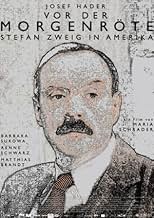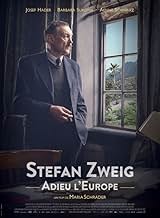PUNTUACIÓN EN IMDb
6,7/10
2,8 mil
TU PUNTUACIÓN
"Before Dawn" narra los años de exilio del famoso escritor judío austriaco Stefan Zweig, su lucha interior por la "actitud correcta" ante los acontecimientos de la guerra que desgarró Europa... Leer todo"Before Dawn" narra los años de exilio del famoso escritor judío austriaco Stefan Zweig, su lucha interior por la "actitud correcta" ante los acontecimientos de la guerra que desgarró Europa, y su búsqueda de un nuevo hogar."Before Dawn" narra los años de exilio del famoso escritor judío austriaco Stefan Zweig, su lucha interior por la "actitud correcta" ante los acontecimientos de la guerra que desgarró Europa, y su búsqueda de un nuevo hogar.
- Dirección
- Guión
- Reparto principal
- Premios
- 6 premios y 10 nominaciones en total
Reseñas destacadas
Josef Hader is one of the best actors you will ever see. Believe it. If you do not know anything about Zweig and if you want to see Hader acting, because you have not seen him before than go for this one. It is entertaining enough to sit it through somehow. And Hader is - as always - a magnet to the eyes. But apart from Haders's acting this movie is a disaster. Zweig's life has so much potential, but Maria Schrader decided to show Zweig's inner struggle with his emigration from Europe to America in 5 or 6 long snapshot-dialogues. And to deliver the message with everything what happened in Zweig's life, Schrader was forced to bend the talking in the dialogues in such a way that all information was said in some sort of everyday tittle-tattle between Zweig, his wives, and other people. So the movie gets very artificial and artistically forced. And so we got tired in our seats. It would have been much better to make a mock-documentary about Zweig (with Hader). Anyway, for lovers of great acting I recommend it, but only because of Hader's unmissable acting: to be honest, Hader could play an old sneaker resting for years in a shoe box and it would still be worthwhile seeing it.
--> lack of plot or interest. Great acting, dialogue, casting, etc, etc. But just too talky, boring and ultimately I no longer cared what was going to happen (although I pretty well knew in advance how things turned out, anyway).
A great film . For message, for fine exporation of immigration in war time, for acting and for the impressive solution - the mirror on the door of wardrobe as good example.
Indeed, it seems a sketch.
Good cinematography, impressive acting but not very profound, to thesistic accents.
But, for me, this is its basic virtue. The humanism of Stefan Zweig , expored, in gentle manner from inside, the essence of the great ideas reflected by his books, ambiguities poetic used, the pressure of friends and ex enemies to be helped, saved, his power accentuating his vulnerabiity.
It is more than a biographic film. For the magnificent work of Josef Hader, for the inspired perspective of Maria Schrader , it represents a wise remind of fundamental values defining our society.
Indeed, it seems a sketch.
Good cinematography, impressive acting but not very profound, to thesistic accents.
But, for me, this is its basic virtue. The humanism of Stefan Zweig , expored, in gentle manner from inside, the essence of the great ideas reflected by his books, ambiguities poetic used, the pressure of friends and ex enemies to be helped, saved, his power accentuating his vulnerabiity.
It is more than a biographic film. For the magnificent work of Josef Hader, for the inspired perspective of Maria Schrader , it represents a wise remind of fundamental values defining our society.
What a masterpiece in quiet tones, insinuation and blank spaces. And the viewer needs to fill and interpret them. What Maria Schrader did not do is a biopic by numbers, but - by showing sketches of a few days of Austrian-Jewish writer Stefan Zweig's life in exile in Brazil during WWII - what happened without a doubt to many other artists, intellectals and others who had fled the German nazi regime. Josef Hader's acting is brilliant, how he hurries from government reception to PEN congress to press conference - always keeping up appearances but beyond his friendly and modest behaviour and the thankfulness to his hosts lies despair about the state of things in europe, his uprooting and depression. Only on occasion - when he speaks with his ex-wife (absolutely wonderful: Barbara Sukowa) and a befriended journalist (likewise: Matthias Brandt) who - coincindentially - moved into the neighbourhood of his last residence, Petropolis - he finally reveals it: 'How can anyone stand this at all?'. Or, in another scene you can see it in his touched-wistful gaze when an untalented brass band gives a poor performance of 'Auf der schönen blauen Donau" ('On the blue Danube') during an improvised (and very funny) reception in a province town in the jungle. The epilogue, shortly after his and his current wive's suicide, again shows the mastery of Maria Schrader's direction: dry police procedural, shocked neighbours and officials, mourning or praying friends, Matthias Brandt reading the suicide note - a panopticon in the wardrobe mirror that occasionally shows the two dead bodies. You only sit there and you are amazed and deeply moved. What a fantastic film!
10clanciai
This is a very sad film, but if the ambition was to give as correct and truthful a picture as possible of Stefan Zweig's exile dilemma, it has succeeded overwhelmingly well. The character of the film is as close to documentary as a feature film can be, it is almost overly realistic in catching every day life scenes of the author and his friends and family, and the introductory scenes in South America, especially the Pen conference in Buenos Aires in 1936 give insight enough into Stefan Zweig's public standing and views and his definite refusal to take any political standing at all. That was maybe his life's tragedy, he wanted to keep it pure of any commitment for or against any worldly state and ideology, but in the end he was forced to abandon his idealism to finally take a stand against nazism in his autobiography "The World of Yesterday" and his last work "Schachnovelle". That could be seen as a personal moral bankruptcy in giving up his idealistic view of humanity, and he committed his suicide almost directly after finishing the story. It was found after his death.
Of course, a film like this can't tell the whole truth but only give glimpses of it, but the glimpses are accurate and expressive enough and give a fairly good view of the whole picture. He actually contemplated suicide already much earlier in his career, he even asked his first wife Friederike to join him in suicide, but she had her two daughters (from a previous marriage) to live for, while his second wife was free to join him.
It's a beautiful picture for its infinite melancholy expressed only in suggestions but giving a very accurate interpretation of the very complex and tragic case of Stefan Zweig, who was the greatest writer of his time.
Of course, a film like this can't tell the whole truth but only give glimpses of it, but the glimpses are accurate and expressive enough and give a fairly good view of the whole picture. He actually contemplated suicide already much earlier in his career, he even asked his first wife Friederike to join him in suicide, but she had her two daughters (from a previous marriage) to live for, while his second wife was free to join him.
It's a beautiful picture for its infinite melancholy expressed only in suggestions but giving a very accurate interpretation of the very complex and tragic case of Stefan Zweig, who was the greatest writer of his time.
¿Sabías que...?
- CuriosidadesOfficial submission of Austria for the 'Best Foreign Language Film' category of the 89th Academy Awards in 2017.
- ConexionesFeatured in Women Make Film (2018)
- Banda sonoraThe Blue Danube Waltz
Composed by Johann Strauss
Selecciones populares
Inicia sesión para calificar y añadir a tu lista para recibir recomendaciones personalizadas
- How long is Stefan Zweig: Farewell to Europe?Con tecnología de Alexa
Detalles
- Fecha de lanzamiento
- Países de origen
- Sitio oficial
- Idiomas
- Títulos en diferentes países
- Stefan Zweig: Adeu a Europa
- Localizaciones del rodaje
- São Tomé e Príncipe(Bahia, Brazil)
- Empresas productoras
- Ver más compañías en los créditos en IMDbPro
Taquilla
- Recaudación en Estados Unidos y Canadá
- 78.372 US$
- Fin de semana de estreno en EE. UU. y Canadá
- 11.729 US$
- 14 may 2017
- Recaudación en todo el mundo
- 1.370.772 US$
- Duración1 hora 46 minutos
- Color
- Relación de aspecto
- 2:39
Contribuir a esta página
Sugerir un cambio o añadir el contenido que falta

Principal laguna de datos
By what name was Stefan Zweig: Adiós a Europa (2016) officially released in Canada in English?
Responde





































